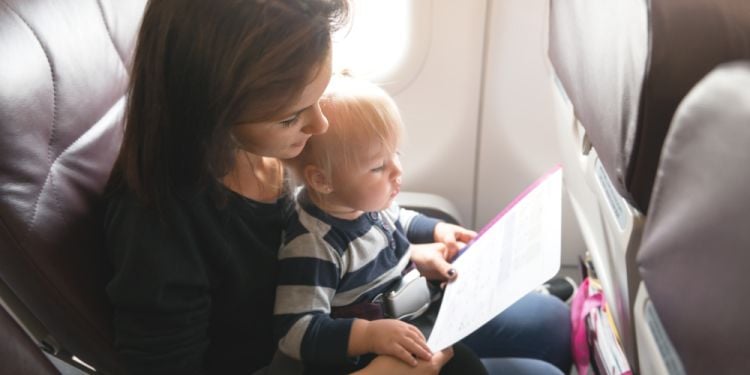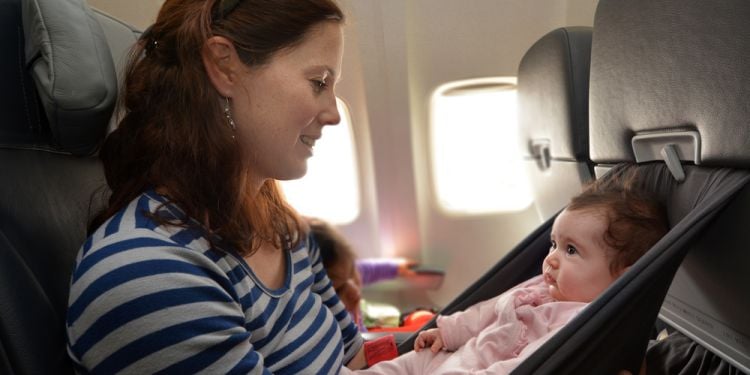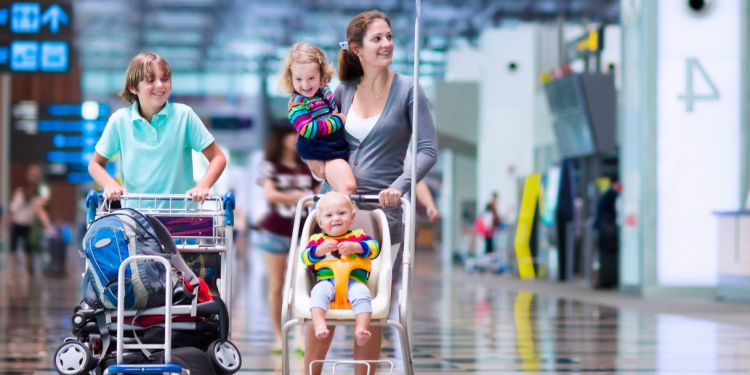Before the flight
The last days before the flight tend to be the most stressful because your mind continuously slips from one possible disaster to another. Here are a few important things to organise and consider before getting on the plane that will ease things for you and your child.
Organise your cabin luggage

A flight with children can be totally unpredictable, as it's impossible to know exactly how a baby or a child may be affected by air travel. So always prepare for the worst case scenario to stay ahead of the game. For example, if, on the ground you would need one diaper, in the air be prepared to use four — distress can cause abdominal discomfort, and in such a case you won't regret those extra packed diapers.
Lily, a US mother who travelled from Washington DC to Athens, Greece with her eight-month baby and a three-year-old child, advises: “When travelling with children pack your carry on as if the checked-in luggage will not make it to the destination (at least, not on the same day as you).”
Other things to not leave behind are your child's favourite toy, a tablet that may replace poor in-flight entertainment for children, and some colouring or activity books for your toddler. Even though it's impossible to predict your child's behaviour during their early flights, you can predict the tendencies. Lily says: “Games and books can serve as distraction tools, and treats or other small rewards are usually effective with unruly toddlers. When physical discomfort is the cause, there's not much a parent can do. It's a good idea to consult the paediatrician before travelling, and, if applicable, to pack pain relievers.”
Feeding your baby during the flight requires a thorough planning — if you are feeding milk, carry a small cool bag and store the right amount of bottles. Also, a baby carrier or a sling can be practical when walking up and down the aisle or transferring from one flight to another. A thin blanket will come in handy when the lights on the plane go suddenly on, or when you have to breastfeed.
Opt for comfort on the plane
Planes have children-friendly seating, and most international flights offer cribs for infants and exit row seats, but these are limited and offered on first come first served basis. To avoid disappointment, book your tickets as early as possible.
A question that frequently comes up is which is the best flight to book when travelling with a baby?
Lily says: “It is rather difficult and impractical to change a child's sleep schedule. On average, you can only deviate by 15 minutes a day, so it would take a week to adjust the schedule by only one hour. A wiser approach is booking a flight that works the best with the children's sleep schedule. For example, for an overnight trip, pick a departure time that's closest to the baby's bedtime. Falling asleep on a plane is challenging even for some adults, so do not assume that bedtime will go like clockwork. However, your best bet is to follow your usual bedtime routine (give the bottle, read a book, sing a song, etc.).”
Prepare your child for the flight

If this is going to be your toddler's first flight, you should prepare them for the experience in a fun and engaging way. For example, a couple of weeks before the flight, you can read books about aeroplanes and being at the airport, allow them to choose a few items to pack, and do role-plays pretending you're the pilot or the policeman at the airport.
Be aware of the airline's regulations
Regulations differ from airline to airline, so read through the travelling with children section and don't hesitate to contact your airline in advance for any questions you may have. Some airlines, for example, are keen on refrigerating breast milk, other are very flexible with carry on luggage, and for the more demanding parents, you may be pleased to hear that some airlines have trained Sky Nannies!
In-flight
During the flight, some of the major concerns for most parents are about the baby crying, disturbing other passengers, and ear discomfort. It's normal for the baby to cry during take-off and landing due to change of pressure — be ready to nurse or bottle feed at that times or to give a pacifier for comfort. If there are other toddlers on board, allow socialising, but be conscious of other passengers' comfort and noise levels. We are confident that with the right preparation, you will have a pleasant flight!
At the destination
Congratulations, you have made it!
Both infants and toddlers will find the way to make up the sleep they may have lost during travel (usually at the cost of the parents' sleep). For example, the kids may not have slept on the flight, but as soon as you get into your rental car, they will crash immediately and be all fresh upon arriving at your final destination. Try to adjust to the new time zone right away and enjoy your time with your family whether it's a new expat adventure or a leisure trip.
How about you? Have you recently travelled by plane with your baby or toddler? How did you find it? Any advises you would like to share with other parents?
















